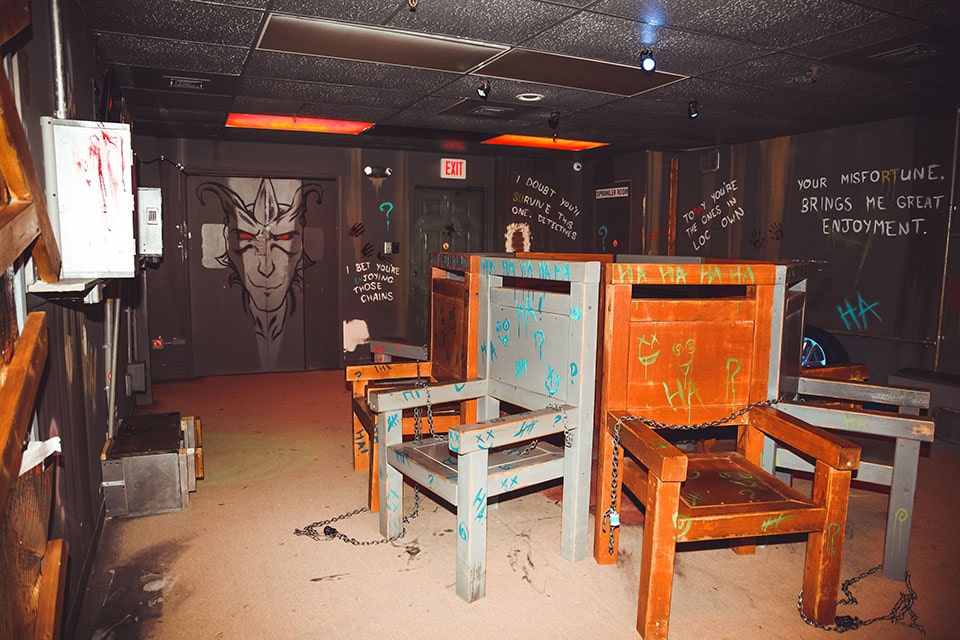Team Techniques: Exactly How to Collaborate Successfully in an Escape Area
Teams have to actively pay attention to each member's understandings, assign duties that line up with specific staminas, and keep regular check-ins to make certain focus and protect against redundancy. By promoting a setting that values cohesion and flexibility, teams can substantially heighten their performance and success rates.
Establish Clear Interaction

To help with clear interaction, it is essential to assign a main factor of contact for info circulation. Quick, focused updates from each team participant can maintain the team informed without frustrating them with information.
Appoint Roles Purposefully
While clear communication sets the foundation for efficient teamwork, designating roles strategically makes sure that each group member's toughness are used properly. In a getaway area situation, the time-sensitive and intricate nature of difficulties demands a well-organized strategy to task delegation. By determining and leveraging individual proficiencies, groups can optimize their analytical capabilities and improve total performance.
First, examine the unique skills and features of each participant. Somebody with an eager eye for information could excel in discovering concealed things, while a logical thinker could be better fit to addressing problems. It's equally essential to have a leader who can look after progression, manage the timeline, and make definitive phone calls when needed. This duty frequently needs strong business and social abilities.
Second, ensure that roles are adaptable and versatile. As brand-new obstacles arise, the group needs to have the ability to pivot, reallocating tasks as required. This adaptability aids keep energy and stops traffic jams that might happen due to rigid role jobs.
Inevitably, a strategic strategy to duty task not only maximizes the toughness of each group participant however likewise fosters a natural setting, driving the group towards a successful retreat.
Use Diverse Skills
Recognizing and using the varied abilities within your team can considerably boost your efficiency in an escape area. Each group participant brings one-of-a-kind strengths to the table, and successfully leveraging these capabilities can expedite analytical and enhance general performance. For example, an employee with strong logical skills may succeed at analyzing intricate codes or patterns, while another with eager empirical abilities may promptly spot concealed ideas that others may forget.
Urge group members to voice their insights and ideas promptly, making certain that all possible remedies are taken into consideration. Furthermore, designating tasks that straighten with each participant's staminas can avoid bottlenecks and ensure that progression is constant.
Additionally, diversity in abilities usually converts to diversity in thinking designs, which is very useful in a getaway room setup. While some obstacles may require sensible reasoning and precision, others could gain from imaginative and Homepage side thinking. By recognizing and leveraging this variety, teams can resolve a more comprehensive variety of obstacles better, thereby raising their possibilities of an effective retreat.
Manage Time Efficiently

First, allot first mins for a quick survey of the room. Recognize noticeable challenges and split tasks based upon group members' strengths, guaranteeing that nobody is still. Set internal time checkpoints to evaluate progression regularly; as an example, aim to have half the problems fixed by the mid-point of the more game. This practice can aid keep the team concentrated and avoid time from slipping away undetected.
Additionally, stay clear of one-track mind. If a problem is taking as well long, rotate group members or go on to another difficulty, returning later with fresh viewpoints. Communication is extremely important-- keep every person updated on addressed challenges Get More Information and continuing to be tasks to stay clear of redundant initiatives.
Lastly, use any kind of hints or ideas sparingly however purposefully - best escape room. Understanding when to request for help can conserve valuable time. By adhering to these time monitoring principles, teams can significantly enhance their opportunities of a successful and enjoyable getaway area experience
Debrief and Reflect
Reflection is an essential element of group growth and improvement in the context of getaway spaces. As soon as the challenge is completed, whether efficiently or otherwise, it is important for the group to participate in an organized debriefing session. This process enables employee to assess their performance, identify staminas, and determine locations for renovation.
Begin the debrief by discussing what went well. Highlight certain circumstances of reliable interaction, analytic, and collaboration. Recognizing these positive habits strengthens them and motivates their repeating in future obstacles.
Go over minutes of complication, miscommunication, or inefficient techniques. Motivate an open and constructive dialogue where group participants can share their viewpoints without fear of objection.
Verdict
Finally, successful partnership in an escape space is based upon clear communication, tactical duty tasks, the efficient usage of diverse abilities, and proficient time monitoring. Normal check-ins and structured debriefings are important for keeping emphasis and fostering continual enhancement. By creating a natural and adaptive team setting, the possibility of efficiently fixing puzzles and attaining the goal of escaping the area is considerably enhanced. This technique not only makes sure success but additionally promotes cumulative growth and understanding.